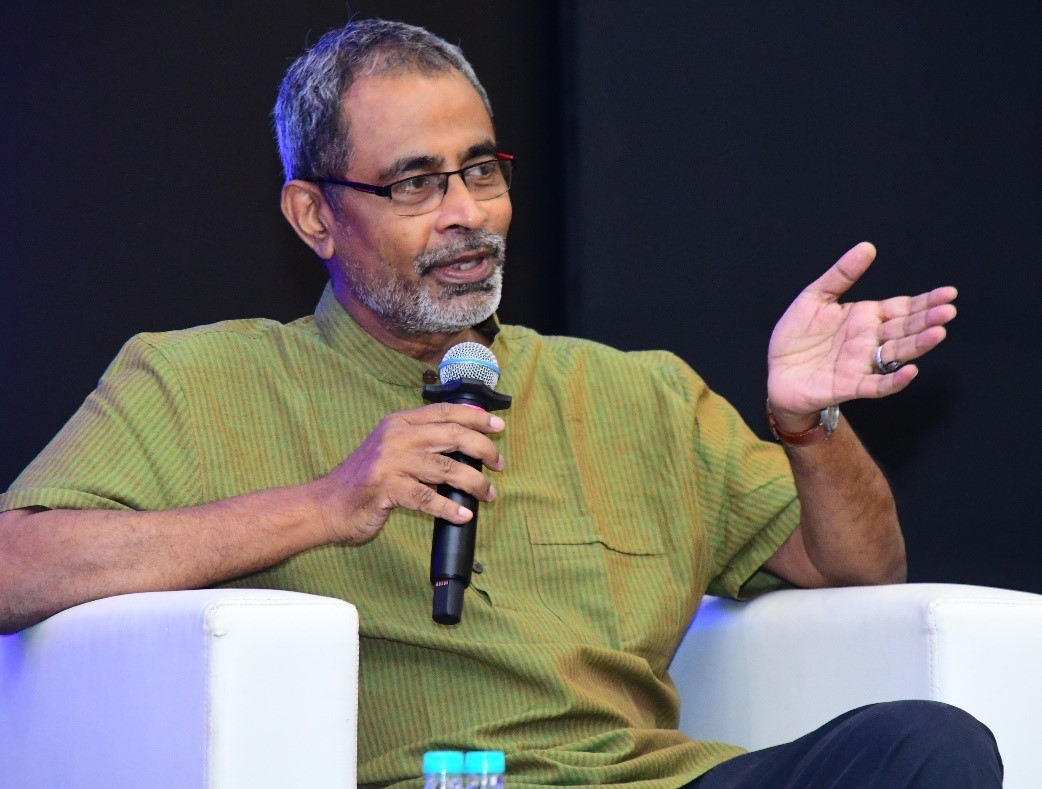The 18th Mumbai International Film Festival (MIFF) hosted an enriching In-Conversation session titled ‘Beyond Boundaries’ featuring acclaimed filmmakers and cinematographers R.V. Ramani and Sunny Joseph. This engaging session delved into the art and philosophy of cinematography, captivating the audience with profound insights and thought-provoking discussions.
Opening the session, Sunny Joseph emphasized the importance of originality in narrative cinema, echoing the sentiment of oneness and unity. Quoting Social reformer Sree Narayana Guru, he stated, “One who loves, lives,” likening cinema to “love 24 times per second.” He highlighted that cinema, whether feature film or documentary, serves as a mirror reflecting societal needs and inadequacies.
Sunny Joseph stressed the necessity of respecting the subjects and environment where filmmakers shoot, a lesson he learned from his mentor, Director G. Aravindan. He advocated for minimal disturbance while shooting documentaries, suggesting that understanding the language of the subjects helps in capturing genuine emotions and rhythms. Addressing the relationship between cinematography and editing, he noted that good editors discern the inherent rhythm within shots, emphasizing the interconnectedness of these two art forms.

(In Photo: Eminent filmmaker and cinematographer Sunny Joseph in an In-Conversation session at 18th MIFF)
National Award winner Shri R.V. Ramani shared his approach to cinematography, which revolves around creating empathy for the subject and the setting. He described how unplanned, spontaneous moments during filming often result in magical, transformative scenes. For Ramani, understanding the film’s concept is crucial; he believes that the end of a shot reveals itself naturally when possibilities are sought.
Both filmmakers discussed the evolving landscape of cinematography. Sunny Joseph praised the advancements in digital camera technology, which have alleviated some of the workload and provided cinematographers with greater freedom. He encouraged young filmmakers to embrace experimentation, criticizing the lack of experimental films in contemporary cinema.

(In Photo: National Award winning filmmaker and cinematographer R.V. Ramani in an In-Conversation session at 18th MIFF)
R.V.Ramani reflected on the normalization of fictional elements in modern documentaries, particularly those on streaming platforms. He argued that while scripts can be useful for finding producers, they are not always necessary, as a concept note and the filmmaker’s vision often suffice.
The session was interspersed with video clips from the acclaimed works of Sunny Joseph and R.V. Ramani, including Devathakal, Piravi, Children of Mini Japan, A School of My Own, Beyond the Wheels, Face Like a Man, and Windfall of Grace. This blending of visual and intellectual stimuli provided a jugalbandi of thought and imagery, leaving the audience deeply inspired.
Sunny Joseph
Sunny Joseph, an eminent cinematographer and graduate of the Film and TV Institute of India (FTII), has significantly contributed to both fiction and non-fiction cinema. With an impressive portfolio that includes 65 feature films and an equal number of documentaries and short films, Sunny has collaborated with some of the most esteemed directors in the industry. His notable fiction works include Piravi, Vasthuhara, Nizhalkuthu, Train to Pakistan, and Kahini, while his acclaimed documentaries include Sahaja, Ayurveda, Goddesses, and Light Up The Sky. Joseph has also held prominent positions as the Chairman and General Secretary of the Indian Society of Cinematographers and currently serves as its Treasurer.
R.V. Ramani
R.V. Ramani, a celebrated filmmaker and cinematographer, has carved a niche for himself in the world of documentary filmmaking. A national award winner, Ramani’s documentaries are known for their unique, impressionistic style that explores various aspects of expression. A graduate in Physics from Mumbai University, Ramani’s journey began in photojournalism before he specialized in Motion Picture Photography at the Film and TV Institute of India, Pune, graduating in 1985. Over the years, his works and retrospectives have been featured in numerous international film festivals, earning him acclaim and recognition worldwide.

Comments are closed.